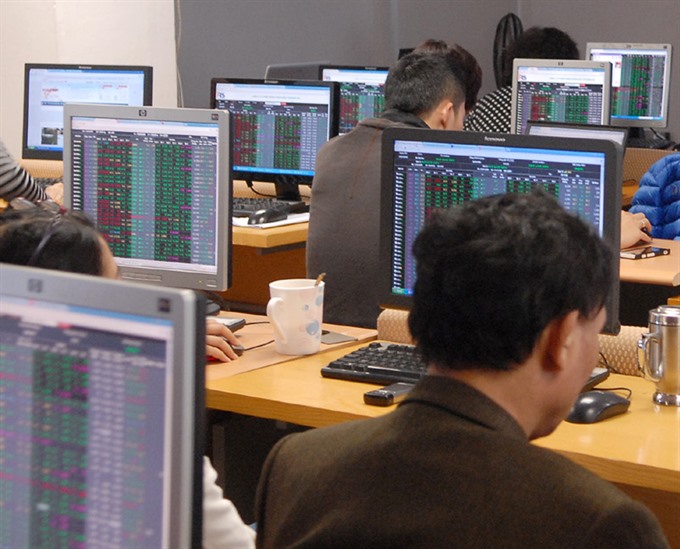 Economy
Economy

Despite a strong rebound on Friday, Vietnamese shares are expected to remain sluggish this week given a lack of business information and market dependence on large-cap shares.
 |
| Investors follow market’s fluctuations at the Royal International Securities Joint Stock Company’s office in Hà Nội. — VNA/VNS Photo Tuấn Anh |
HÀ NỘI — Despite a strong rebound on Friday, Vietnamese shares are expected to remain sluggish this week given a lack of business information and market dependence on large-cap shares.
The benchmark VN Index on the HCM Stock Exchange (HOSE) rose 1.28 per cent to finish Friday at 843.73 points. It made a weekly gain of 0.4 per cent.
The HNX Index on the Hà Nội Stock Exchange rose 0.91 per cent to end the trading week at 104.36 points. The northern market index dropped a total of 1.9 per cent last week.
Each session saw an average of 206.3 million shares traded, worth VNĐ3.91 trillion (US$173.7 million).
The trading figures posted an increase of 4.1 per cent in volume and 4.9 per cent in value compared to the previous week.
Large-cap stocks remained the most influential factor on the market last week.
FLC Faros Construction (HOSE: ROS) was the large-cap share that created the strongest effects on the benchmark index.
The VN Index gained in three sessions and closed down in two, with gaining days alternating with losing days.
ROS also had the same movement, closing up a total 9.2 per cent last week.
“The dependence on a particular stock means market sentiment is in higher risk of reversal if ROS loses steam,” Viet Dragon Securities Co (VDSC) said in a note.
In addition, November always lacks supportive information, forcing investors to be cautious.
According to Hoàng Thạch Lân, head of individual investor division at VDSC, the stock market had not reflected its true strength in the past two weeks.
“The indices posted either slight growth or decline, while share prices continued to fall and investors remained losers,” he told tinnhanhchungkhoan.vn last week.
The decline of the stock market suggested investors should start selling, which would send the indices lower, and triggered securities firms to make “margin calls” for investors that had taken big loans for investment, Lân said.
A margin call is a broker’s demand on an investor using margin to deposit additional money or securities so that the margin account is brought up to the minimum maintenance margin. Margin calls occur when the account value depresses to a value calculated by the broker’s particular formula.
An investor receives a margin call from a broker if one or more of the securities he had bought with borrowed money decreases in value past a certain point. The investor must either deposit more money in the account or sell off some of his assets.
According to VDSC, the total margin lending of all securities firms had reached about VNĐ36.15 trillion by September 30. The figure increased by 9.2 per cent from the second quarter and 22 per cent year on year.
Margin lending grew at the fastest in the second quarter of the year with a quarterly growth rate of 12 per cent. Most brokerage firms took advantage of strong market performance in the first seven months to encourage investors to borrow more.
However, those firms began to tighten margin lending when the stock market showed signs of slower growth in August, with daily average trading liquidity falling from VNĐ4.36 trillion in the second quarter to around VNĐ3.9 trillion.
Margin calls are expected to push stocks down further, making the market continue to suffer.
Silver lining with APEC week
In spite of negative impacts that margin calls could have on the market, it helps send stocks to lower price ranges that are attractive enough to boost bottom picking and liquidity, Lân said.
Low-priced stocks would help improve investor confidence and draw investment back to the market, boosting the indices after one gloomy week, he added.
In addition, Việt Nam is hosting the APEC Economic Leaders’ Week, which takes place from today to Saturday and is expected to be good news for the stock market, Lân said.
“The APEC Economics Leaders’ Week could create a wave that supports the stock market,” he said. “People are looking for agreements and contracts that are signed between Việt Nam and other APEC member economies, benefiting the country’s economy and businesses.” — VNS




